Shark Fishing


Jerung ditangkap dan dibunuh semata-mata kerana siripnya. Hampir selebih dari badannya akan dibuang begitu sahaja. Pembunuhan berleluasa jerung akan menyebabkan ketidakseimbangan ekologi laut. Namun itu lah hakikat kehidupan..
ECheng
The frigate birds are getting more aggressive, and one of them actually smashed into me while swooping down for a bit of shark gut. The local children are following suit with their own version of aggressive curiosity. One little girl kept repeating "chino, chino," affirming the obvious: I look Chinese. She then switched to exclaiming, "Jackie Chan! Jackie Chan!" which was amusing for about thirty seconds, but after ten minutes I felt like bludgeoning her with one of the dead blue sharks laying at my feet. I'll bet Jackie could do that pretty easily.
I can't help but anthropomorphize the sharks that are being hauled up to the beach. Threshers always look surprised, and seem to be saying, "oh, shit! I'm dead!" through their open mouths as they gaze blankly from their huge eyes. I've always wanted to see thresher sharks and blue sharks; it's unfortunate that the first ones I'm seeing in my life are being cut up into pieces. It's not as bad as it could be, however. Most sharks that are slaughtered are killed for their fins alone, their carcasses thrown back into the ocean to rot uselessly. The shark carcasses hauled up at Manta are sold for their meat, and there are laws banning the export of shark fins, which legally can only be sold locally.
Alex tells me that ten years ago, a day's catch at Manta might be 1,000 or more sharks, whereas these days the catch seems to vary seasonally between 150 and 400 sharks a day. Combined with having to venture 50 miles or more offshore, it is pretty clear that the local shark population is dropping rapidly. While we were observing the action on the beach, I kept looking across the water at the industrial fishing boats docked at the pier and wondering what sort of catch they were delivering. This local operation is nothing compared to the large Taiwanese-funded finning vessels that are raping the oceans.
As a seafood eater, it may seem a bit hypocritical for me to even comment about marine conservation, but even those of you out there who eat seafood must admit that the practice of shark finning is extremely wasteful and unsustaineable. I recently attended a rehearsal dinner for a friend's wedding where shark fin soup was served, and I felt sick sitting there watching everyone eat them. I was even tempted to get up and leave. With over 100 million sharks killed each year (much of the activity is illegal), the ocean's top predator is dying off quickly. People tend not to care about sharks because they aren't considered to be "cute," but removing the top predator in any ecosystem is a catastrophic move. (Nevermind that the shark itself is an amazing animal so well evolved that it has barely changed in the last 400 million years!)
Manta, Ecuador
26 June
The fisherman and traders were more frenzied today, and fish were brought in at a more rapid pace. Early in the morning, a good-sized bull shark was hauled up from a small boat, eventually fetching $350 when sold to a trader (again, most of its value is in its fins). Like yesterday, the majority of the day's catch consisted of large blue sharks, large thresher sharks, and small hammerhead sharks. A pregnant thresher was cut open, and Carlos pulled two well developed juveniles from her womb. Baby thresher sharks practice interuterine cannibalism (the larger babies eat their siblings), so a typical brood might consist only of one or two individuals. Juvenile threshers shimmer with a beautiful purple sheen, and their skin is silky soft to the touch. We were told that young threshers are a delicacy, and the two pups were sold almost immediately.
The frigate birds are getting more aggressive, and one of them actually smashed into me while swooping down for a bit of shark gut. The local children are following suit with their own version of aggressive curiosity. One little girl kept repeating "chino, chino," affirming the obvious: I look Chinese. She then switched to exclaiming, "Jackie Chan! Jackie Chan!" which was amusing for about thirty seconds, but after ten minutes I felt like bludgeoning her with one of the dead blue sharks laying at my feet. I'll bet Jackie could do that pretty easily.
I can't help but anthropomorphize the sharks that are being hauled up to the beach. Threshers always look surprised, and seem to be saying, "oh, shit! I'm dead!" through their open mouths as they gaze blankly from their huge eyes. I've always wanted to see thresher sharks and blue sharks; it's unfortunate that the first ones I'm seeing in my life are being cut up into pieces. It's not as bad as it could be, however. Most sharks that are slaughtered are killed for their fins alone, their carcasses thrown back into the ocean to rot uselessly. The shark carcasses hauled up at Manta are sold for their meat, and there are laws banning the export of shark fins, which legally can only be sold locally.
Alex tells me that ten years ago, a day's catch at Manta might be 1,000 or more sharks, whereas these days the catch seems to vary seasonally between 150 and 400 sharks a day. Combined with having to venture 50 miles or more offshore, it is pretty clear that the local shark population is dropping rapidly. While we were observing the action on the beach, I kept looking across the water at the industrial fishing boats docked at the pier and wondering what sort of catch they were delivering. This local operation is nothing compared to the large Taiwanese-funded finning vessels that are raping the oceans.
As a seafood eater, it may seem a bit hypocritical for me to even comment about marine conservation, but even those of you out there who eat seafood must admit that the practice of shark finning is extremely wasteful and unsustaineable. I recently attended a rehearsal dinner for a friend's wedding where shark fin soup was served, and I felt sick sitting there watching everyone eat them. I was even tempted to get up and leave. With over 100 million sharks killed each year (much of the activity is illegal), the ocean's top predator is dying off quickly. People tend not to care about sharks because they aren't considered to be "cute," but removing the top predator in any ecosystem is a catastrophic move. (Nevermind that the shark itself is an amazing animal so well evolved that it has barely changed in the last 400 million years!)
More pics & report at:
http://echeng.com/travel/manta/sharkfishing/
http://echeng.com/travel/manta/sharkfishing/



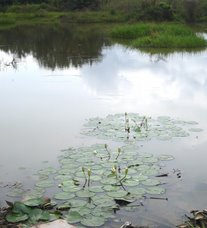






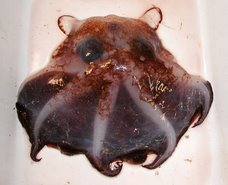
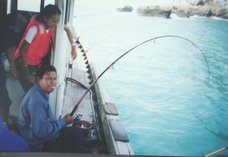
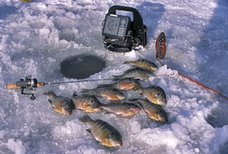


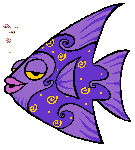
1 comment:
nice blog; bravo
Post a Comment